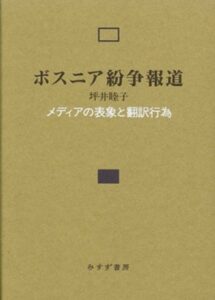
Mutsuko Tsuboi
Tokyo: Misuzu Shobo, 2013
Reviewed by Yuichi Asai, Tokyo University of Agriculture and Technology
This book is an excellent study on media representation and discourse on the “Bosnian conflict” (1992-1995), which took place after the end of the Cold War, and especially examines its translation act of media coverage from the ethnographic perspective of communication. The author, who is fluent in Serbian and Croatian, analyzes texts in both the original language and English, and highlights the process in which the news report in Japan got deflected through translating the English media coverage into Japanese. Thus, the book reveals that the act of translation engaged in by the media is not a referential practice that brings about propositional “equivalence” between languages, but rather a social practice that ideologically creates such interdiscursive “equivalence” between two different events.
Specifically, the first half of the book begins with a theoretical discussion on two aspects in language use: “what is said” (referential aspect) and “what is done” (interactional/socio-indexical aspect). It demonstrates that discussions on the concept of “equivalence” in translation studies have often focused on language structure and the referential aspect of language use, but have not sufficiently examined the aspect of how such equivalence emerges through its discursive process, that is, the socio-indexical or ideological aspect of language use. Thus, the importance of semiotic theorization on culture as communication or sign-processes in linguistic anthropology, which includes both aspects of language use, is highlighted. In the latter part of the book, the media discourses on the Bosnian conflict are examined based on such an analytical perspective. In particular, it examines texts belonging to 4 different genres of major Western media: Newsweek (the weekly news magazine), Foreign Affairs (the international diplomatic journal), The fall of Yugoslavia (the reportage), and The death of Yugoslavia (the BBC television documentary), and the discourse analysis is conducted on the translation process through which Japanese media produce translated texts. The analysis points out that while the Bosnian conflict arose against the sociocultural and historical backdrop of the former Yugoslav peoples, it characteristically occurred in the international relations of modern ideologies such as nationalism, nation-state, and national self-determination. On the other hand, the media coverage of the Bosnian conflict by the major Western media had rather put more emphasis on or attributed the cause of the conflict to the former Yugoslav peoples themselves through representing it as “ethnic cleansing.” Accordingly, such a discourse of the major Western media was disseminated around the world and one of the processes by which such way of representing the Bosnian conflict was strengthened globally was the translation practice into Japanese news media context.
Through the above discussion, this book clarifies that the concept of “equivalence” that is generally presupposed with the act of translation engaged in by the media is interactionally created. It also illustrates the importance of media translation and the social role it plays in addressing the issue of multicultural and multilingual equality and coexistence. Successfully bringing together Balkan studies, translation studies, and ethnographic studies of communication, the book attests the effectiveness of applying linguistic anthropological perspective to translation studies by reconsidering the notion of “equivalence” as sociocultural and communicative, thus semiotic process.
